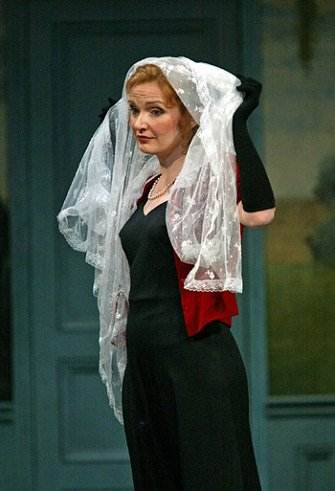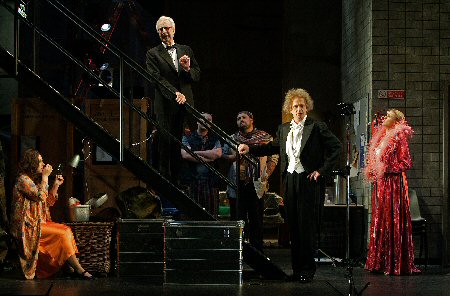S & H Opera Review
Richard Strauss ‘Ariadne auf Naxos’ Soloists, Orchestra of the Royal Opera House, dir. Sir Colin Davis, Royal Opera House, Covent Garden, June 22nd 2004. (M.E.)
‘Ariadne auf Naxos’ is, along with ‘Capriccio,’ essentially the composer’s exposition of the conflicts between patronage and creativity, and between the relative importance of words and music as well as, more ephemerally, what music in the operatic sense really ‘means,’ so it was doubly ironic that the famous ‘It’s all over for the fat lady - she can’t fit into the little black dress’ episode should have centred upon this opera and this version of it. Those of us who value productions which genuinely attempt the theatrical found ourselves torn, but ultimately plumped (sorry) for the soprano’s side, on the grounds that a little black dress is less important than a big golden voice. Of course, we were right: this ‘Ariadne’ directly reverses the situation with the recent 'Arabella' in which three of the greatest Strauss voices of our time soared heavenwards against the backdrop of a stunningly inept production: here, we have two pleasant little voices and two almost-great ones, doing their very best – which isn’t always quite enough – within a well-conceived production which respects the music and the singers and often delights the eye.
Of course, the staging of the Prologue just has to follow the now-customary concept of using a grand – ish hotel foyer as the setting: why? Is this ‘art patron’ now to be forever stylized as Donald Trump? The set is wonderful, as it should be: no tack here, no pointless escalators and constricting staircases – instead all breathes taste and elegance, and incorporates a genuine coup de theâtre as the elevator slides down from the glossy foyer to the pitch pine and greasepaint of the lower depths occupied by the ‘artistes.’ This makes even more obvious the sense of ‘them and us’ which permeates the relationship between the musicians and their ‘employers,’ a relationship in which those below stairs really are servants with no sense that they ‘celebrate men’s average lives’ as Shaffer put it.
The prologue is dominated by the Composer, here taken by the much – loved Susan Graham, who is a very good, but not great interpreter of the part: she does not compare to Janet Baker, for example, but she sings with grace and expressiveness, nowhere more so than in ‘Du Venus Sohn’ which was exquisitely moving. Her relationship with her tutor, here taken by the histrionically excellent but vocally underpowered Dale Duesing, was much more tempestuous than usual, partly because his line about being so much more worldly wise than his pupil rang especially true here. Graham presents a vivid, vulnerable figure who succeeds in making us see the absurdity as well as pathos of this youth, and even if her ‘Musik ist eine heilige Kunst’ did not quite soar as it should, this was an affecting portrayal.
Diana Damrau’s Zerbinetta was given far more chance to shine here than she had as Fiakermilli last month, and shine she did: I find Zerbinetta extremely irritating as a character, in fact along with Olga (Onegin) and Oscar (Ballo) she is one of the most annoying of operatic creations, but of course I take the point that she represents the tart with the heart, who extols the virtues of casualness whilst harbouring a loving soul. I’m one of those people who could cheerfully live without any of the silly bits in Strauss (all that ‘Nein nein, Ich trink kein Wein’ stuff in ‘Rosenkavalier,’ all that infernal yodelling in ‘Arabella’) so I often attempt not to notice Zerbinettas, but this one defied those attempts because she actually made beautiful sounds whilst doing all her daft mincing and moping about. ‘Ein Augenblick’ and ‘Grossmächtige Prinzessin’ were both dashingly confident and penetratingly accurate, and, like Graham’s, hers was a believable and involving character.
All the smaller parts had been cast from strength, with especially noteworthy cameos from the superb John Graham Hall as the Dancing Master, and from the graceful and sweetly musical Rachel Nicholls as Echo: even the ‘Four Comedians’ were not nearly so irritating as they can often be, with Alasdair Elliott’s Brighella especially appealing. This made it all the more unfortunate that the two principals were not strongly cast: no one who knows this opera could possibly have failed to regret that Deborah Voigt was not singing Ariadne, avoirdupois and all, and Richard Margison’s Bacchus was at the level of an ENO house tenor in a small role, which is not good enough for the Royal Opera House where one expects - maybe that should be, is entitled to expect – Ben Heppner.
Strauss is about singing, like it or not, and if you ain’t got the soar, you don’t get the roar – except here in London, where we are all so darned nice (except to certain directors, whom we choose to regard as a sub-species) that we give ecstatic ovations to singers who we know haven’t come up with the goods, because they don’t have them – and in this case of course, our sense of fair play was paramount because after all, it was hardly Anne Schwanewilms’ fault that she was brought in to replace Voigt, or indeed that she is as slim and delicately beautiful as her voice. I first heard her in this role under Simon Rattle at the Barbican, where she was also replacing someone, this time indisposed, and thought then that although her voice is silvery and sweet, it did not possess the heroic heft needed for the part: my view remains unchanged (ed., for a different view of this singer as Ariadne follow the hyperlink above). Hers is a face upon which intelligence, sweetness of character and genuineness are written as clearly as is her beauty, and it was lovely to see how touched she was by her reception, but that mobile face registered so clearly that she, too, knew that it was motivated by kindness rather than judgment.
Ironically, Ariadne did not sport a ‘little black dress,’ or not, at least, as I would define it: for the most part, she was in a sort of Monsoon – ish outfit of black mid-length sundress topped with a short red cardigan, resembling a sensitive Drama teacher agonizing about the end of term production. Sensitivity very much characterizes this soprano, and it was quite possible to empathize with her character: for once, Ariadne seemed truly lovable and truly noble. However…. except for one moment when shivers did go down my spine – at ‘Hermes!’ Schwanewilms does not display the soaring, silvery tone needed for this music: neither ‘Es gibt ein Reich’ nor ‘Ein schönes war’ really filled the house, and an unfortunately ill-placed breath (first night nerves, I’m sure) spoilt the first line of the latter. As a character, she was believable: as a singer, she was acceptable, especially in that her phrasing is musical and her tone soft and persuasive, but not ideal on this occasion, and she does not need me or anyone else to tell her that.
Richard Margison’s Bacchus was even less suitable for his part: at least the soprano was very successful in dramatic terms, but this Bacchus, perhaps due partly to his placement on stage, made very little impact. It all comes down to that appearance / voice conundrum again: one can cheerfully accept the veriest runt as an heroic tenor, so long as he can deliver the vocal goods, but this one couldn’t, at least on this showing, there being nothing about either his singing or his demeanour to suggest the boy – god who rescues Ariadne from her solitude. ‘Circe, Circe’ entirely lacked the requisite ‘ring,’ and ‘Gibt es kein Hinüber’ hardly registered as a duet.
The orchestra, under Colin Davis, bloomed with real Straussian elegance and bittersweet pathos – the strings said all that needed to be said about the shiveringly fragile nature of Art, and there was plenty of swagger where it was needed, yet never overplayed: if matters onstage sometimes disappointed, one could find solace from the sounds coming from the pit. Those who saw this opera conducted by Jeffrey Tate some years ago will not have been disappointed by this evening’s orchestral performance, but I’m sure that, like me, they will have fond memories of Jessye Norman, standing monumentally in her vast swathings, and pouring out a stream of golden sound – I wonder what she would have made of the ‘little black dress’ – set fire to it, probably, and the director with it.
Melanie Eskenazi
Photocredits: Clive Barda
Composer - SUSAN GRAHAM
Zerbinetta - DIANA DAMRAU
Primadonna (Ariadne) - ANNE SCHWANEWILMS


 Return to:
Return to: